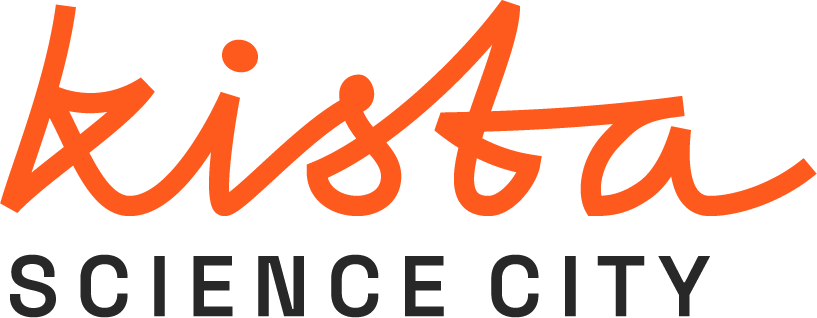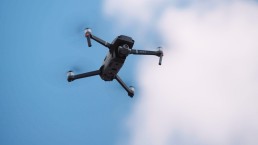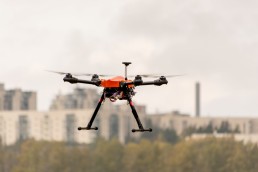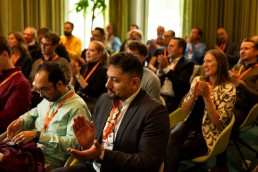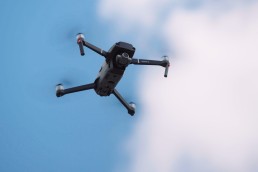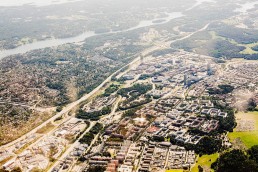Kista takes the lead in smart drone services
Kista takes the lead in smart drone services
Drones will soon be serving customers, citizens, businesses, and authorities with a wide range of revolutionary new services.
Kista Science City hosts one of Sweden’s largest knowledge clusters when it comes to new mobility. A new project will prepare cities for the next phase in this fast-growing drone economy. The tech scene in Stockholm has millions of reasons to get excited.
Drone-based services are expected to be game-changing in the coming years: The potential is enormous in areas as medical transport, emergency response, traffic monitoring and delivery of food and packages, just to name a few. On top of that: using drones can be both effective and sustainable.
But implementing this at a large scale is complex. While the technology for drone services advances quickly, the ecosystem needed for the” lower airspace mobility revolution” isn’t in place. Yet.
That’s what’s most probably about to change in the upcoming years, as the drone market is expected to boom by 2030.
Funding, expertise and tests
Stockholm will take a leading role in a three-year project to identify, test, and evaluate solutions linked to urban drone services in European cities.
The goal is to develop tools for adapted urban planning, to evaluate lifting and landing sites in an urban environment, and to build an ecosystem that pave the way for drone traffic to become part of a multimodal transport system.
The City of Stockholm is collaborating with Kista Science City and the Swedish Air Navigation Services in a consortium that will be focusing on funding, expertise, and implementation of tests.
– New strategies and tools are needed to be able to handle the increasing number of drones in urban areas. We are extremely proud that Stockholm has been selected as one of three European cities to actively lead the development of shaping the future of mobility, says Karin Bengtsson, CEO, Kista Science City.
Contact us if you want to be part of the new drone economy
If you are a tech startup developing products or services related to drones, contact us (Eleonor Sjödin Turah), to be in the loop.
The startup Aerit is one of the tech companies part of this fast-growing eco-system. Founder and CEO, Alexander Perrien, feels the vibrating excitement for drone services in Kista:
– Most companies we have met understand the immense economic and social value autonomous robots can bring and are actively working on solutions and supporting products, he says.
Drones bring endless potential for society
Alexander paints a picture of almost endless potential for society as it fully taps into the possibilities:
– Drones themselves are essentially highly mobile sensor suites, and there is little that prevents us from offering the data we collect as a service in the future. Imagine on the way back from dropping off groceries to a local balcony, the drone stops by a local water reservoir to scan for excess nutrients, sample the air near a local production facility, or update a 3D map of new development. Highly accurate hyper-local data can be provided on demand.
– We are building a future where, at the tap of a button, businesses and individuals alike can send anything anywhere around the globe through a series of coordinated purpose-built autonomous solutions.
About the project “Preparing Cities for Air Mobility – CITYAM
* 13 partners from industry, academia, and cities collaborate on behalf of the Interreg Baltic Sea Region. Over three years, these will test, evaluate, and prepare sustainable solutions for lower airspace mobility in Europe’s cities.
* Stockholm will have a leading role together with Helsinki and Hamburg.
* Lars Strömgren, traffic commissioner in the Stockholms stad says: ”The capital of Sweden must be equipped for future mobility services. The development of drone deliveries is going at rocket speed right now. Therefore, we will investigate how drones could best be used in Stockholm and what rules they would require. We will also develop a plan for possible landing sites and carry out a pilot project with drones in an urban environment.”
* Billy Josefsson, Research & Innovation Urban Air Mobility, Luftfartsverket, says: ”This is really good for the industry, we need champions like the City of Stockholm. The arguments, needs for competence, and solutions identified in CITYAM and for Stockholm will be a valuable contribution to the entire national transition of gradually introducing technology, formulating rules and starting to use drone services. There is so much societal benefit to be gained, the challenge ahead is to build competence and to find good forms of collaboration between the actors.”
CITYAM
Preparing Cities for Air Mobility – CITYAM
Urban Air Mobility
CITYAM is an innovative project aimed at preparing cities for the future of urban air mobility (UAM) in the Baltic Sea region. With traditional traffic infrastructure reaching its limits, UAM is gaining attention as a sustainable and efficient solution to urban mobility challenges.
13 partners from industry, academia, and cities across Europe are collaborating in CITYAM. Over three years, the project will aim to develop responsible and sustainable solutions for integrating Unmanned Aerial Vehicles (UAVs) or drones into traditional urban mobility systems. The focus is to help cities and citizens adapt to the changes brought by UAVs and to see the possibilities it brings.
Stockholm, together with Helsinki and Hamburg, will play a leading role in the project. The City of Stockholm, Kista Science City, and the Swedish Air Navigation Services are part of the consortium that will be focusing on funding, expertise, and implementation of tests.
To achieve the goal of integrating UAVs into urban transport systems, the project will identify, test, and evaluate solutions for adapting urban planning, evaluating lifting and landing sites, and building an ecosystem that paves the way for drone traffic to become part of a multimodal transport system. In addition, the project aims to develop tools for managing urban air mobility (UAM) and increase the capabilities of public officials in this domain.
The project will also measure the impact of UAVs on public acceptance and develop an ecosystem that supports it. Ultimately, the project aims to enhance public officials’ capabilities and provide them with the necessary tools to manage UAM effectively.
Partners
City of Stockholm
Luftfartsverket
Kista Science City
Funded by
Interreg Baltic Sea Region
Contact
Karolina Pamp
karolina.pamp@kista.com
Request for information
Summary
Drones will soon be serving customers, citizens, businesses, and authorities with a wide range of revolutionary new services.
Kista Science City hosts one of Sweden’s largest knowledge clusters when it comes to new mobility. A new project will prepare cities for the next phase in this fast-growing drone economy.
In the media
- Pressrelease – Stockholm leder vägen när Europas städer förbereds för drönare
- Hur ska drönare samsas i luften ovanför en stad? – Nyteknik.se
- Snart flyger drönare fram över staden – Computer Sweden
- EU projekt ska kratta for flygande bilar i Stockholm potentialen ar stor – DI digital
- Stockholms nya framtidsuppdrag – testa drönarleveranser – SR
- Stockholm en av tre teststäder i EU:s drönarprojekt – Omni.se
- Stockholmarna blir försökskaniner när drönarleveranser ska bli verklighet – Breakit
- Stockholm har ledarroll då Europas städer förbereds för drönare – INFRASTRUKTURnyheter.se
Related articles
Navigating the skies: Drones and urban mobility
Smart city,Kista Science City,Drones
Safer, more efficient and sustainable cities with the help of drones? At Mobility Day 2023 experts in urban mobility and drone technology…
Kista takes the lead in smart drone services
Smart city,Drones,Autonomous vehicles
Drones will soon be serving customers, citizens, businesses, and authorities with a wide range of revolutionary new services. Kista Science…
CITYAM
A new project will prepare cities for the next phase of the fast-growing drone economy.
Drones – a natural layer in the future transport system
What impact will the new U-space regulations, Sustainable Urban Mobility Planning and UAMs have on Swedish authorities and entities?
Nordic drone initiative
A platform for exchange of ideas between the Nordic countries and the rest of the world
Connected sensors to reduce garbage collection stops by 80%
How connected sensors can reduce garbage collection stops - by 80%
155 waste bins in parks and along walkways in the Kista area have been equipped with sensors that automatically signal when they need to be emptied.
The project – made in collaboration between the city of Stockholm, two startups and Kista Science City – gives a glimpse of how technology can make our cities more efficient, clean and sustainable.
In every major city, thousands of waste bins are scattered throughout parks, walking paths and public areas where people hang out or pass by.
These bins are emptied on pre-scheduled days, leading to overfilled or underutilized bins. Overfilled bins and litter in inappropriate areas do not only create a negative impression of the city, but also impacts the perceived safety of the surroundings.
But technology offers a pathway to change this.
How connected sensors make a difference
Traditionally, predicting the level of fullness for each waste bin across the city on a particular day has been a challenging task. The rate at which a bin fills up is related to factors like how many people have been passing by (which can vary based on weather, season, local events and other factors), location, proximity to other bins and more.
What if each waste bin could provide real-time updates on its current fill?
Thanks to a sensor, this is now possible.
– Our sensor sends out a pulse of light to a cone-shaped space inside the bin, measuring the speed at which the light reflects from 100 points within that space. The pulse is sent hourly – or every five minutes upon request, providing immediate information on the bin’s fill level. This data is then transmitted in real-time to an online server using low-energy network, explains Anders Helgesson, founder of Norrsidans Innovation AB.
Norrsidans is one of two companies involved in the project to develop solutions for the city. The other one, Bintel, uses similar technology:
– Once the data is transmitted to the cloud, it’s analysed and presented to provide a basis for planning routes, and for long-term improvements, says Daniel Lundell, Bintel.
Game-changing results
The connected bins were normally emptied 7138 times per week. When emptied only when full, garbage collectors only needed to stop by 1072 times. Overall, waste disposal stops could be reduced by up to 80% per week while ensuring full bins are emptied.
This is a game-changer for waste management in cities.
However, so far, it’s just a test. Until 2024 Rinkeby-Kista is locked to an agreement with a contractor to keep emptying litter bins as scheduled. But once that contract ends, municipality will take back the operations – with a clear intent to build a sustainable and effective organization.
A similar project in Södertälje led to the revelation that one out of three stops were necessary when collecting garbage.
However, optimizing garbage collection routes is just the beginning of the benefits that connected sensors can provide.
Bringing value out of of data
Thanks to sensor-collected data, cities can now make decisions based on validated facts and no longer need to operate blindly.
– The potential is huge. In our dialogue with the city as a whole, we note that data-driven knowledge will become even more important in the years ahead, says Annika Ström, Head of unit for City Development in Rinkeby-Kista district.
As an example, she mentions the upcoming new regulations that make cities responsible for collecting packages for recycling.
– We will need to measure which fractions will fill up fastest, so that those bins can be dimensioned accordingly, at the right locations, and be emptied in an optimised way.
However, more actions are needed to keep the city clean. In Rinkeby-Kista alone, there are on average about four tons of scrap dumped in parks, forests and public lawns every month; everything from car tires to laughing gas cylinders.
More data was added
To address this problem, garbage collectors in the project were asked to register where and when they noticed litter in all the wrong places, allowing the city to gather more data and reveal the extent of the problem.
One interesting finding from this data was that there’s no correlation between full waste bins and lots of littering in the surrounding areas, indicating that adjusting the size or adding more bins is just part of the solution.
The city needs to think of ways to nudge people to do the right thing, which is currently being discussed.
Collaboration for innovation
Data-driven knowledge is needed not only in formulating challenges but also in implementing solutions. Collaboration across borders is often needed to come to that point. Rinkeby-Kista and partners opened up to challenge their old ways.
– The connected litter bins project helped us to think outside the box, says Annika.
Lucas Uhlén, project manager at Kista Science City, emphasizes that each stakeholder learns from each other and gets a much deeper understanding of how data can be collected and used. The real-world experience from such projects brings what’s needed to advance, improve, and eventually scale.
Ny satsning ska höja kunskapen om cybersäkerhet hos mindre företag
I Stockholm finns ledande expertis inom cybersäkerhet hos akademi, institut och större företag, men kunskapen når inte alltid ut till små och medelstora företag. Nu ska en ny satsning hos två av Stockholms innovationsmiljöer, Kista Science City och Södertälje Science Park, leda till att små och medelstora företag kan dra nytta av befintlig expertis inom cybersäkerhet.
Projektet syftar till att stärka kännedom kring säkerhetsfrågor hos små och medelstora företag i Stockholmsregionen. Detta för att stärka företagens tillväxt och konkurrenskraft i en alltmer digital värld, men också för att höja säkerhetsnivån.
– Vi ser att det idag ställs allt högre krav på cybersäkerhet hos små och medelstora företag. En ökad digital hotbild kan leda till att nya riktlinjer och standarder för cybersäkerhet tas fram, och då är det viktigt att företagen hänger med, säger Richard Granberg på Kista Science City.
Bakom satsningen står de två innovationsmiljöerna Kista Science City och Södertälje Science Park som under flera år samarbetat kring affärsutveckling för små och medelstora företag.
Pilotprogram under våren
Under våren 2023 kommer ett pilotprogram starta upp, där 5–10 företag får möjlighet att genom utbildning, coachning och nätverkande får möjlighet att stärka sina kunskaper om cybersäkerhet. Inledningsvis kommer två branscher prioriteras: medtech och tillverkande industriföretag.
Branscher där digitaliseringen går snabbt och där fler och fler tjänster och produkter är anslutna till andra enheter, nätverk och internet i syfte att effektivisera och förbättra processer och slutprodukt. En i grunden positiv utveckling, men där riskerna för cybersäkerhetshot därmed samtidigt kraftigt ökar och konsekvenserna av säkerhetsbrister och intrång kan få stora konsekvenser för olika berörda parter, inklusive samhället i stort.
Företag sökes
Just nu söker projektet efter företag som skulle kunna vara intresserade av att delta. Deltagande i pilotprojektet är kostnadsfritt och riktar sig till små och medelstora företag i Stockholmsregionen.
Intresserad av att vara med? Kontakta Richard Granberg.
